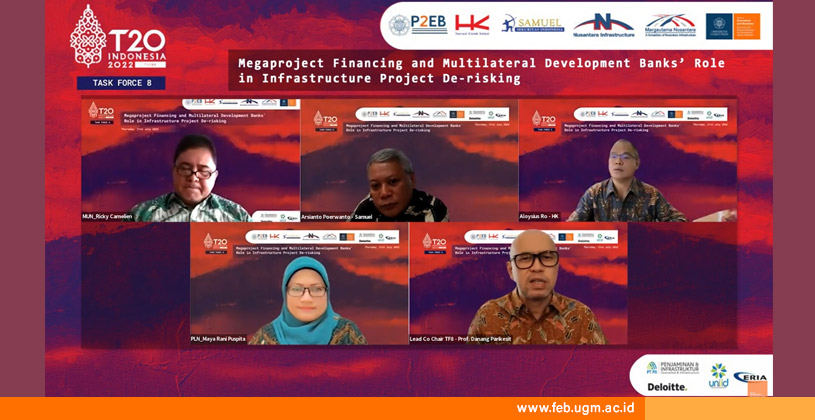The role of the Multilateral Development Bank is seen as important as a catalyst for private sector financing
- Details
- Written by Kirana
- Category: News
- Hits: 1618

On Thursday (21/07) Research and Development of Economics and Business (P2EB) FEB UGM held a webinar and sharing session with the theme “Megaproject Financing and Multilateral Development Bank's Role in Infrastructure Project De-risking.” This event is a series towards the T20 Summit and the results of the discussion from this event will be used as recommendations in Task Force 8 (TF8) Notes for the T20 communique. The webinar and discussion sessions were moderated by Prof. Dr. Techn. Ir. Danang Parikesit, M.Sc., IPU., ASEAN.Eng, as Lead Co-Chair of Task Force 8.
Think20 (T20) is a network of leading research institutions and academics from the international community that contributed to the G20 Summit. The T20 created a communique that included recommendations based on evidence-based research to be shared with G20 leaders for their consideration in the G20 communique during the G20 Summit. Meanwhile, Task Force 8 (TF8) is one part of Indonesia's T20 which focuses on Resilient Infrastructure and Financing.
In this session, there were four expert speakers related to the theme of the event. The first speaker was Ricky Camelien who is the Director of Business Development and Asset Expansion of PT Marga Utama Nusantara. In his presentation, Ricky mentioned several key success factors in developing infrastructure mega projects, which are project proposals, project financing, partners, and build quality. In addition, Ricky also explained how to build a competitive financing structure for infrastructure development. According to him, there are four points to consider, namely construction costs, project financing structure, currency risk, and the self-equity types.
Furthermore, the second speaker was Arsianto Poerwanto as Managing Director of Investment Banking Group of PT Samuel Sekuritas. Focusing on the discussion of de-risk mega project financing related to toll road projects. Arsianto discussed several points in the discussion session, the first was about government guarantees. According to him, government guarantees are something that is very good to have, but difficult to obtain. Then, he discussed the National Strategic Project (PSN) which discussed land acquisition and also discussed automatic tariff adjustments. Finally, Arsianto explained about the suitable use of financial instruments, including long-term funding by the Bank, hedging mechanisms, and other long-term instruments such as bonds.
The event continued to a session by the third speaker, namely Aloysius Kiik Ro as Deputy President Director of PT Hutama Karya (Persero). In his session, he shared about the construction project of the Trans Sumatra Toll Road (JTTS). Aloysius said that the Trans Sumatra Toll Road was considered economically viable, but not financially. Therefore, the Government of the Republic of Indonesia assigned Hutama Karya as a BUMN to develop JTTS. The government gives full support to Hutama Karya to develop JTTS through various schemes and funding sources. In addition, Aloysius also discussed asset recycling which was also carried out by Hutama Karya in developing JTTS to reduce existing financial risks.
Then, the topic of funding from the mega project of the State Electricity Company (PLN) (Persero) in the session was discussed by the fourth speaker, namely Maya Rani Puspita as Vice President of the Financial Institution of PT PLN (Persero). Maya discussed various financing schemes for PT PLN such as two-stage loans, onshore/offshore direct lending with/without government guarantees, global and local bonds, and others. In addition, she also compared and discussed the pros and cons between financing from Multilateral Development Banks and Commercial Banks. At the end of the session, Maya explained several milestones for PT PLN (Persero) in financing its projects, one of which is PLN signed a USD 600 million loan financing with ADB to foster clean energy projects and in December 2020 PLN successfully issued the first green loan worth USD 500 million. The event closed with a discussion session between the speaker and the participants.
Reportase: Kirana Lalita Pristy.


